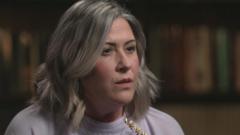In an emotional interview, Caroline Darian reveals the impact of her father's abuse on her life and her determination to advocate for those silenced by chemical submission, aiming to educate and empower victims.**
Rebuilding Lives After Darkness: The Fight Against Chemical Submission**

Rebuilding Lives After Darkness: The Fight Against Chemical Submission**
Caroline Darian speaks out about her father's horrific crimes and her mission to raise awareness for victims of drug-facilitated sexual assault.**
In November 2020, Caroline Darian received a call that shattered her world when her mother revealed the shocking truth about her father, Dominique Pelicot. "He had been drugging her for roughly ten years, enabling multiple men to assault her," Caroline shares in a poignant interview. "That moment erased my previous understanding of life." Now 46, she confronts the grim reality of her father's actions and their implications on both her and her mother, Gisèle.
Pelicot was sentenced to 20 years for orchestrating the assault of his wife, alongside dozens of men he lured into participating. The case was uncovered after Pelicot was arrested for upskirting—a seemingly innocuous crime that led authorities to uncover a trove of horrifying evidence on his devices. Thousands of images and videos depicted his wife, clearly unconscious, being violated by various attackers. These events thrust issues of sexual violence and chemical submission into the national conversation.
Caroline, having learned about her father's actions, supports not only her mother but also seeks to galvanize change in how society understands and addresses drug-facilitated sexual assault. She notes that the phenomenon is often underreported, with victims frequently unable to remember or recognize their abuse. "This issue goes unnoticed because many victims don’t even realize they’ve been drugged," she explains.
Determined to shed light on this taboo subject, Caroline penned a book titled "I'll Never Call Him Dad Again," navigating her family’s trauma and the complexities surrounding chemical submission. She acknowledges the challenges her mother faced accepting the possibility of her own daughter being a victim. Nevertheless, Gisèle courageously took to the public platform during the trial to expose the painful truth of her husband’s actions, signaling a turning point in their shared journey of healing.
Despite grappling with her father’s dual identity as both a predator and a parental figure, Caroline insists she will not let the past define her or her future. "I have his DNA, but that does not mean I am him," she states resolutely. Caroline explains that her father is, indeed, aware of his crimes and consequently, she considers him a danger to society—unworthy of rehabilitation or release.
As the two women begin to reclaim their lives post-trial, they find strength in each other and their community. Giséle is reportedly recovering well, while Caroline now channels her energy into educational initiatives about sexual abuse prevention, particularly focusing on teaching children about the risks of chemical submission.
With her supportive family behind her—her brothers and her loving son—Caroline embraces her newfound purpose following the devastation of that fateful November. She is determined to help others heal and ensure victims of sexual violence are given a voice, advocating for stronger support networks to aid those who suffer in silence. As she moves forward, Caroline Darian embodies resilience, embodying the hope that her story will spark change for countless others affected by similar horrors.




















